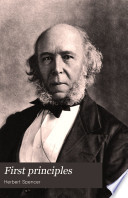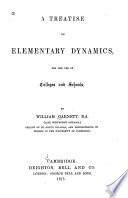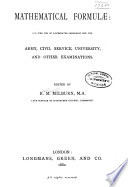 | Herbert Spencer - Philosophy, Modern - 1864 - 652 pages
...statement of the laws of motion. The first of these laws is : Every body continues in its state of rest or of uniform motion in a straight line, except in so far as it is compelled by impressed forces to change that state," Thus Professor Tait quotes, and fully approves, that conception... | |
 | John Kerr - Mechanics - 1866 - 358 pages
...MOTION. First Law. Every body perseveres in its state of rest or of uniform rectilinear motion, except so far as it is compelled to change that state by force impressed. Second Law. Change of motion is proportional to the moving force impressed, and takes place... | |
 | William Garnett - 1875 - 332 pages
...trace them into some of their consequences. LAW I. Every body will continue in its state of rest or of uniform motion in a straight line, except in so far as it is compelled by impressed force to change that state. time is required, to produce a finite velocity in a finite... | |
 | Peter Guthrie Tait - Force and energy - 1876 - 396 pages
...of the Laws of Motion. The first of these Laws is : — Every body continues in its state of rest or of uniform motion in a straight line, except in so far as it is compelled by forces to change that state. In other words, any change whether in the direction or in the rate... | |
 | James Andrew Blaikie - 1878 - 184 pages
...case with the observed event. 30. First Law of Motion.—Every body continues in its state, of rest or of uniform motion in a straight line, except in so far as it is compelled by forces to change that state. If we propel a curling-stone along a horizontal surface of ice, its... | |
 | Edward John C. Morton - 1880 - 58 pages
...air to be heavy. 4. The Laws of Motion are — * I. Every body perseveres in its state of rest, or of uniform motion in a straight line, except in so far as it is compelled to change that state by forces impressed on it. II. Change of motion is proportioned to the moving force impressed, and takes... | |
 | Science - 1880 - 900 pages
...statement of the laws of motion. The first of these laws is : Every body contimies in its state of rest or of uniform motion in a straight line, except in so far as it is compelled by impressed forces to change that state.'1'' Thus Professor Tait quotes, and fully approves, that... | |
 | R. M. Milburn - Mathematics - 1880 - 116 pages
...sides. 21. Laws of Motion, as enunciated by Newton. I. Every body will continue in its state of rest or of uniform motion in a straight line, except in so far as it is compelled by impressed force to change that state. II. Change of motion is proportional to the impressed force,... | |
 | Augustin Privat-Deschanel - Electricity - 1880 - 1176 pages
...motion, and is stated by him in the following terms: — " Every body continues in its state of rest or of uniform motion in a straight line, except in so far as it is compelled by impressed forces to change that state." The tendency to. continue in a state of rest is manifest... | |
 | Science - 1880 - 922 pages
...statement of the laws of motion. The first of these laws is : Every body continues in its state of rest or of uniform motion in a straight line, except in so far 'as it is compelled by impressed forces to change that state." Thus Professor Tait quotes, and fully approves, that conception... | |
| |